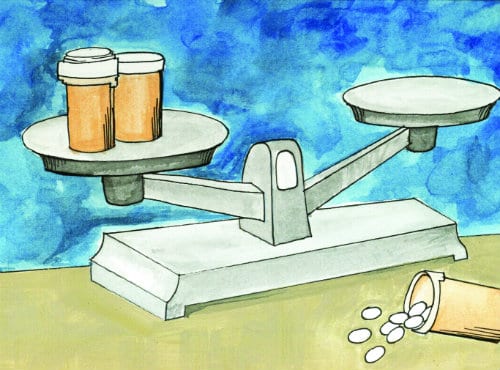By Osefame Ewaleifoh
 An Assault on Access to Mental Health Care
An Assault on Access to Mental Health Care
The recent passage of the Patient Protection and Affordable Care Act (PPACA) and other recent legislative efforts has raised the question: how does the PPACA affect mental health access? Access to mental health care is particularly significant because mental health serves as a powerful comorbidity for several pathological conditions, from diabetes to obesity. Furthermore, the cumulative cost of managing mental illness—a chronic life condition—very quickly becomes prohibitive for most patients. The financial cost of treating mental health is even more debilitating in poor communities. Historically, Medicaid has provided a safe refuge for the poor, who otherwise could not afford the mental health care they desperately need. However, recent national economic and financial constraints pose severe threats to Medicaid as a source of mental health care.
Specifically, the recently passed Save Medicaid Access and Resources Together (SMART) Act in Illinois threatens to take much-needed medical resources away from mentally ill citizens of limited means—the same people who often need these services the most. This article explores the cost of mental illness and care, the health implications of the recently passed SMART Act, and concludes with potential strategies to protect the most vulnerable members of our community from those consequences.
The SMART Act and Mental Health
In the last few years, several states have adopted aggressive strategies to reduce the ballooning cost of health care. In Illinois, the exploding deficit and increasing cost of health care led to the enactment of the SMART Act in 2012. While the broad objective of the SMART Act was to trim down the cost of health care in the state, a central core of the Act was requiring Medicaid recipients to get prior authorization from their doctor for any prescription medications numbering over four-per-month. Specifically, the SMART Act states: “On and after July 1, 2012, the Department shall impose limitations on prescription drugs such that the Department shall not provide reimbursement for more than 4 prescriptions, including 3 brand name prescriptions, for distinct drugs in a 30-day period, unless prior approval is received for all prescriptions in excess of the 4-prescription limit[1].” While the stated objective of the SMART Act is to curtail the skyrocketing cost of health care, it is impossible to ignore its potentially devastating effect on access to care for the mentally ill.
Several recent studies indicate that the cost of care is the fundamental limiting factor to the utilization of and access to mental health services. In a recent report from the Substance Abuse and Mental Health Services Administration (SAMHSA), the single biggest reason for not receiving mental health services is “Could Not Afford the Cost.” When cost is combined with responses around under-insurance, over 65 percent cited money-related issues as the primary reason for not pursuing treatment[2].
This economic bottleneck is particularly important because mentally ill patients are already less likely to stick with treatment regimens. Structural limitations to access to care will thus only exacerbate already poor access to care and treatment adherence among the mentally ill. It is thus imperative that strategies be put in place to address these obstacles to care.
Policy Options
 The following three specific policy options could be used to combat the current draconian measures that could potentially restrict health care access for the mentally ill:
The following three specific policy options could be used to combat the current draconian measures that could potentially restrict health care access for the mentally ill:
- The 4-drug limit of the SMART Act can be completely rescinded. There is no medical or financial evidence to suggest that it will lead to any significant cost savings. On the contrary there is good reason to believe that this Act will lead to medication and care rationing, which will in turn lead to inadequate treatment of sick patients. This will ultimately culminate in a health care system with much sicker patients, leading to a greater drain on already limited financial resources.
- Alternatively, the SMART Act could be amended to exempt from the 4-drug limit persons who are on Medicaid due to disability or mental illness. A slight variation on this could be an amendment of the SMART Act to exempt psychotropic medications, or at least exempt anti-psychotic and anti-depressant medications. As currently written, the SMART Act does make some exceptions for certain drug classifications: “Drugs in the following therapeutic classes shall not be subject to prior approval as a result of the 4-prescription limit: immunosuppressant drugs, oncolytic drugs, and anti-retroviral drugs[3].” Based on these existing exemptions, similar exceptions could be made for psychotropic drugs. Exceptions to psychotropic drugs are critical because these treatments provide a fundamental cornerstone to contemporary mental health care[4].
- In the event of failure of these two earlier policy recommendations, an improvement of the prior authorization process must be pursued. The central objective of such an effort is to make the process less daunting for vulnerable, mentally ill patients who might be discouraged by administrative hoops and bureaucratic bottlenecks. Specifically, two primary steps can be taken to improve the prior authorization process: first, the application should be an electronic mail or web-based submission process. This would significantly simplify the application process for potential users. Second, the approval process must be transparent. The transparency of the approval process can be promoted by publishing standards and procedures for prior authorization. This system will ensure that the reasons behind approval or rejection of submitted requests for drug requirements beyond the 4-drug cap will be clear and unambiguous.
Health Implications
The 2001–2003 National Comorbidity Survey Replication (NCS-R), a nationally representative epidemiological survey, revealed that more than 68 percent of adults with a mental disorder (diagnosed with a structured clinical interview) reported having at least one general medical disorder[5,6]. As a thoroughly characterized comorbidity, mental illness has been implicated in exacerbating several disease outcomes including diabetes[7,8], asthma[9], obesity[10] and cardiovascular conditions[11]. Mental illness has also been implicated with increased health risk behaviors such as chronic tobacco use and substance abuse[12]. Thus, as currently written, the 4-drug rule of the SMART Act could impact more than just mentally ill patients; it could have far-reaching ripple effects on patient health across the health care spectrum. The role of mental health as a prevalent comorbidity of several disease pathologies makes it medically and morally imperative that measures be put in place to prevent restriction of access to mental health care.
Current Legislative Action
To stem potentially detrimental health, social, and economic effects, Illinois State Representative Chapa LaVia has recently introduced House Bill 2469, which would carve out several psychotropic medications from the SMART Act’s 4-drug limit. While daunting, the challenge of passing the bill is not unfeasible, as a similar exemption has already been made for immunosuppressant drugs, oncolytic drugs, and anti-retroviral drugs. With the appropriate political, legal, and strategic arguments, the desired modifications to the existing Act can be obtained.
Conclusion
In the current push to find new ways to manage health costs, the knee-jerk reaction to slash access to health care services is a predictable response. This strategy is reflected by the 4-drug rule of SMART Act. Yet while limiting drug access might seem appealing initially, a closer analysis reveals that it could lead to disastrous consequences. Three nuanced strategies are proposed here to both manage costs and ensure access to much-needed psychotropic drugs. If adopted, these strategies will ensure the SMART Act fulfills its stated objective of cutting health care costs while at the same time ensuring that the mentally ill recipients of Medicaid continue to get access to the psychotropic medications they desperately need.
References
- Save Medicaid Access and Resources Together (SMART) Act. (2012). http://www.isp.state.il.us/docs/2012legis.pdf.
- Substance Abuse and Mental Health Services Administration. (2012). Results from the 2011 National Survey on Drug Use and Health: Mental Health Findings. NSDUH Series H-45, HHS Publication No. (SMA) 12-4725. Rockville, MD: Substance Abuse and Mental Health Services Administration.
- Save Medicaid Access and Resources Together (SMART) Act. (2012). http://www.isp.state.il.us/docs/2012legis.pdf.
- Stein, B. D., Sturm, R., Kapur, K., & Ringel, J. (2001). “Datapoints: Psychotropic Medication Costs among Youth with Private Insurance in 1998.” Psychiatric Services 52 (2): 152.
- Kessler, R. C., Berglund, P., Chiu, W. T., Demler, O., Heeringa, S., Hiripi, E., et al. (2004). “The US National Comorbidity Survey Replication (NCS-R) Design and Field Procedures.” International Journal of Methods in Psychiatric Research 13 (2): 69-92.
- Kessler, R. C., Berglund, P., Demler, O., Jin, R., Koretz, D., Merikangas, K. R., et al. (2003). “The Epidemiology of Major Depressive Disorder: Results from the National Comorbidity Survey Replication (NCS-R).” Journal of the American Medical Association 289 (23): 3095-105.
- Egede, L. E., Zheng, D., & Simpson, K. (2002). “Comorbid Depression is Associated with Increased Health Care Use and Expenditures in Individuals with Diabetes. Diabetes Care 25 (3): 464-70.
- Katon, W. J., Young, B. A., Russo, J., Lin, E. H., Ciechanowski, P., Ludman, E. J., et al. (2013). “Association of Depression with Increased Risk of Severe Hypoglycemic Episodes in Patients with Diabetes.” Annals of Family Medicine 11 (3): 245-50.
- Strine, T. W., Mokdad, A. H., Balluz, L. S., Gonzalez, O., Crider, R., Berry, J. T., et al. (2008). “Depression and Anxiety in the United States: Findings from the 2006 Behavioral Risk Factor Surveillance System.” Psychiatric Services 59 (12): 1383-390.
- Petry, N. M., Barry, D., Pietrzak, R. H., & Wagner, J. A. (2008). “Overweight and Obesity Are Associated with Psychiatric Disorders: Results from the National Epidemiologic Survey on Alcohol and Related Conditions.” Psychosomatic Medicine 70 (3): 288-97.
- Goodwin, R. D., Davidson, K. W., & Keyes, K. (2008). “Mental Disorders and Cardiovascular Disease among Adults in the United States.” Journal of Psychiatric Research 43 (3): 239-46.
-
“Smoke Alarm: Mental Illness and Tobacco.” (2013). Lancet 381 (9872): 1071.
About the Author
Osefame Ewaleifoh is a second-year PhD/MPH student in the Driskill Graduate Program at Northwestern University. He currently works in the laboratory of Dr. Greg Smith, where he studies herpes simplex virus neuroinvasion and transport. Osefame is a passionate mental health advocate who seeks to draw attention to disparities in mental health access and resource utilization.
Artwork by Michelle Chabla and Meghan McCarter.

